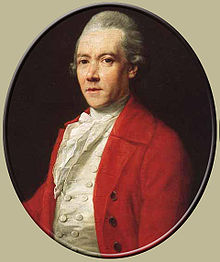Philip Livingston
| Philip Livingston | |
|---|---|
 |
|
| New York State Senate | |
|
In office September 9, 1777 – June 12, 1778 |
|
| Preceded by | Created |
| Succeeded by | James Jay |
| Personal details | |
| Born |
January 15, 1716 Albany, New York |
| Died | June 12, 1778 (aged 62) York, Pennsylvania |
| Nationality | American |
| Spouse(s) | Christina Ten Broeck (m. 1740) |
| Children | 9 |
| Parents |
Philip Livingston Catherine Van Brugh |
| Relatives |
William Livingston (brother) Robert Livingston (brother) Peter V. B. Livingston (brother) Robert Livingston (grandfather) Pieter Van Brugh (grandfather) |
| Alma mater | Yale College |
| Occupation | Merchant, politician |
| Signature | |
Philip Livingston was an American merchant and statesman from New York City. He was a delegate for New York to the Continental Congress from 1775 to 1778, and signed the Declaration of Independence.
Philip Livingston born in Albany, New York, on January 15, 1716 the fourth surviving son of Philip (1686–1749), 2nd Lord of the Manor and Catherine Van Brugh Livingston, the daughter of Albany, New York, Mayor Pieter Van Brugh. Along with his brother, William Livingston (1723–1790), he grew up in the Albany area, dividing his time between his father’s Albany Townhouse and the Manor House in Linlithgo, at the junction of the Roeliff Jansen Kill and the Hudson River.
Philip graduated from Yale College in 1737 and returned to Albany to serve a mercantile apprenticeship with his father. Through his father's influence, he also obtained clerkships in Albany's local government. He then settled in New York City and pursued a career in the import business, trading with the British sugar islands in the West Indies. During King George's War (1744–1748), Livingston made his fortune provisioning and privateering. He also speculated heavily in real estate. He had a stone townhouse on Duke Street in Manhattan and also a forty-acre estate in Brooklyn Heights. He became a merchant, and served as an Alderman of the East Ward from 1754 through 1762.
Also in 1754, he went as a delegate to the Albany Congress. There, he joined delegates from several other colonies to negotiate with Indians and discuss common plans for dealing with the French and Indian War (1754–1763). Livingston became an active promoter of efforts to raise and fund troops for the war. According to Cynthia A. Kiemer, he owned shares in six privateers, making him one of the colony's leading investors.
...
Wikipedia
